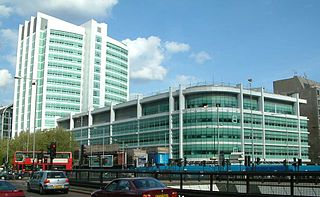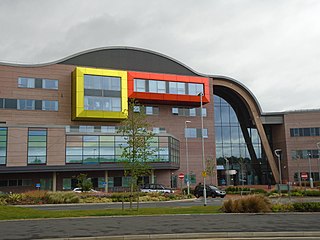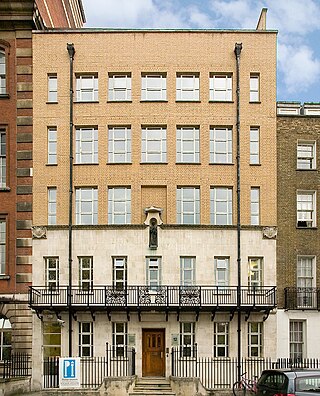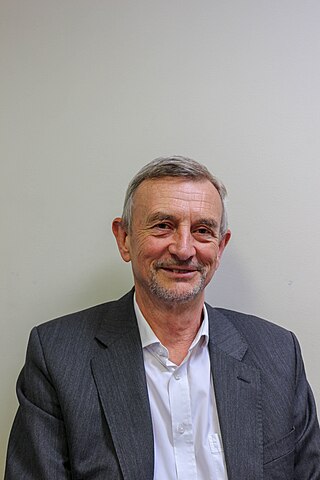Related Research Articles

University College Hospital (UCH) is a teaching hospital in the Fitzrovia area of the London Borough of Camden, England. The hospital, which was founded as the North London Hospital in 1834, is closely associated with University College London (UCL), whose main campus is situated next door. The hospital is part of the University College London Hospitals NHS Foundation Trust.

The National Hospital for Neurology and Neurosurgery is a neurological hospital in Queen Square, London. It is part of the University College London Hospitals NHS Foundation Trust. It was the first hospital to be established in England dedicated exclusively to treating the diseases of the nervous system. It is closely associated with University College London (UCL) and in partnership with the UCL Institute of Neurology, which occupies the same site, is a major centre for neuroscience research.

Queen Elizabeth Hospital in King's Lynn, Norfolk, England. It is located on the outskirts of King's Lynn, to the eastern edge of the town. The catchment area of the Queen Elizabeth Hospital covers the West Norfolk area, South Lincolnshire and Northern part of Fenland District, Cambridgeshire, an area of approximately 1500 km2 and 250,000 people. It is managed by the Queen Elizabeth Hospital King's Lynn NHS Foundation Trust. The Queen Elizabeth Hospital is named after Queen Elizabeth The Queen Mother, rather than Queen Elizabeth II.

Alder Hey Children's Hospital is a children's hospital and NHS foundation trust in West Derby, Liverpool, England. It is one of the largest children's hospitals in the United Kingdom, and one of several specialist hospitals within the Liverpool City Region, alongside the Royal Liverpool University Hospital, Liverpool Women's Hospital, Liverpool Heart and Chest Hospital, the Walton Centre, Mersey Regional Burns and Plastic Surgery Unit, and Clatterbridge Cancer Centre.

Atkinson Morley Hospital (AMH) was located at Copse Hill near Wimbledon, South-West London, England from 1869 until 2003. Initially a convalescent hospital, it became one of the most advanced brain surgery centres in the world, and was involved in the development of the CT scanner. Following its closure, neuroscience services were relocated to the new Atkinson Morley Wing of St George's Hospital, Tooting.

The Wellcome Centre for Human Neuroimaging at University College London is a world-leading interdisciplinary centre for neuroimaging research based in London, United Kingdom. Researchers at the Centre use expertise to investigate how the human brain generates behaviour, thoughts and feelings and how to use this knowledge to help patients with neurological and psychiatric disorders. Human neuroimaging allows scientists to non-invasively investigate the brain structure and functions including Action, Decision Making, Emotion, Hearing, Language, Memory, Navigation, Seeing, Self awareness, Social Behaviour and the Bayesian Brain

The Royal Free London NHS Foundation Trust is an NHS foundation trust based in London, United Kingdom. It comprises Royal Free Hospital, Barnet Hospital, Chase Farm Hospital, as well as clinics run by the trust at Edgware Community Hospital, Finchley Memorial Hospital, and North Middlesex University Hospital. On 1 July 2014, the Barnet and Chase Farm Hospitals NHS Trust was acquired by Royal Free London NHS Foundation Trust, making it one of the largest trusts in the country.

The Eastman Dental Hospital was based on Gray's Inn Road until it co-located with the University College London ear, nose, throat, balance and hearing services on Huntley Street, London, as the Royal National ENT and Eastman Dental Hospitals in October 2019. The hospital continues to provide specialist dental treatment as well as ear, nose, throat, hearing, speech and balance services and is part of the University College London Hospitals NHS Foundation Trust.
UCLPartners is an academic health science centre located in London, England. It is the largest academic health science centre in the world, treats more than 1.5 million patients each year, has a combined annual turnover of around £2 billion and includes around 3,500 scientists, senior researchers and consultants.
University College London Hospitals NHS Foundation Trust (UCLH) is an NHS foundation trust based in London, United Kingdom. It comprises University College Hospital, University College Hospital at Westmoreland Street, the UCH Macmillan Cancer Centre, the Royal National ENT and Eastman Dental Hospitals, the Hospital for Tropical Diseases, the National Hospital for Neurology and Neurosurgery, the Royal London Hospital for Integrated Medicine and the Royal National Throat, Nose and Ear Hospital.
The National Prion Clinic (UK) is part of the University College London Hospitals NHS Foundation Trust. Its aim is to diagnose and treat patients with any form of human prion disease (Creutzfeldt-Jakob disease, CJD). In addition, the clinic facilitates research in diagnostics and therapeutics, organises clinical trials, and counsels those with an increased genetic risk of the disease.

The Royal London Hospital for Integrated Medicine is a specialist alternative medicine hospital located in London, England and a part of University College London Hospitals NHS Foundation Trust. It is the largest public sector provider of complementary medicine in Europe. It is based in the Bloomsbury area of Central London, adjacent to Great Ormond Street Hospital.

University College Hospital at Westmoreland Street, named The Heart Hospital until refurbished and renamed in 2015, was a specialist cardiac hospital located in London, United Kingdom until 2015. It is part of the University College London Hospitals NHS Foundation Trust and is closely associated with University College London (UCL). After the 2015 refurbishment, the hospital now provides thoracic surgery and urology services.

The UCL Queen Square Institute of Neurology is an institute within the Faculty of Brain Sciences of University College London (UCL) and is located in London, United Kingdom. Together with the National Hospital for Neurology and Neurosurgery, an adjacent facility with which it cooperates closely, the institute forms a major centre for teaching, training and research in neurology and allied clinical and basic neurosciences.
A patient hotel provides accommodation for patients, and often their family, who need to be close to a hospital, but do not need a hospital bed. They are usually in the grounds of a hospital, and are used by people who are recuperating or awaiting treatment.
Michael G Hanna is Director of the UCL Institute of Neurology, University College London and professor in clinical neurology and consultant neurologist at the National Hospital for Neurology and Neurosurgery, Queen Square, London, and also Director of the Medical Research Council (MRC) Centre for Neuromuscular Disease.
Mary M. Reilly FRCP is an Irish neurologist who works at National Hospital for Neurology and Neurosurgery. She studies peripheral neuropathy. She is the President of the Association of British Neurologists.

Martin Neil Rossor, is a British clinical neurologist with a specialty interest in degenerative dementias and familial disease.
Alan J. Thompson, MD, FMedSci, FRCP, FRCPI, is Dean of the Faculty of Brain Sciences at UCL; Pro-Provost for London at UCL; Garfield Weston Professor of Clinical Neurology and Neurorehabilitation at the UCL Queen Square Institute of Neurology. He is also a consultant neurologist at the University College London NHS Hospitals Foundation Trust working at the National Hospital for Neurology and Neurosurgery. He is Editor-in-Chief for Multiple Sclerosis Journal.
David John Werring is a British physician, neurologist, and academic specialising in stroke. He is professor of Neurology at the UCL Queen Square Institute of Neurology and current head of Stroke Research Centre and the department of Brain Repair & Rehabilitation at UCL.
References
- 1 2 "Q.S. Enterprises Ltd". Companies House, Cardiff. Retrieved 5 December 2016.
- ↑ "Chenies Mews Imaging Centre" . Retrieved 5 December 2016.
- ↑ "UCLH trust chronology". University College London Hospitals NHS Foundation Trust. Archived from the original on 11 April 2009. Retrieved 10 September 2010.